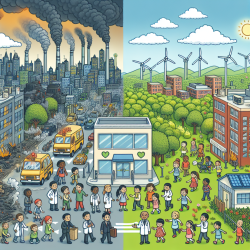Understanding the Impact of Fossil-Fuel Combustion on Pediatric Health
Fossil-fuel combustion is a significant contributor to global air pollution and climate change, posing a grave threat to children's health and equity worldwide. According to the research article titled "Pollution from Fossil-Fuel Combustion is the Leading Environmental Threat to Global Pediatric Health and Equity: Solutions Exist," the emissions from fossil fuels include toxic air pollutants and carbon dioxide (CO2), which are major contributors to climate change and have severe impacts on children's health.
Key Findings and Implications for Practitioners
The research highlights several critical impacts of fossil-fuel pollution on children's health:
- Neurodevelopmental Impacts: Exposure to air pollution has been linked to cognitive and behavioral development impairments in children. These impacts can begin in utero and affect children's ability to learn and function throughout their lives.
- Respiratory and Chronic Diseases: Children exposed to air pollution are at a higher risk of developing respiratory illnesses and other chronic diseases.
- Environmental Injustice: Children in low- and middle-income countries, as well as marginalized communities in high-income countries, are disproportionately affected by fossil-fuel pollution, exacerbating existing health disparities.
Practical Steps for Practitioners
As practitioners, it is crucial to implement strategies that mitigate the impact of fossil-fuel pollution on pediatric health. Here are some actionable steps:
- Advocate for Policy Change: Engage with policymakers to support regulations that reduce emissions from fossil fuels and promote clean energy solutions.
- Promote Awareness: Educate communities about the health risks associated with air pollution and the importance of reducing exposure, particularly for vulnerable populations.
- Support Research and Interventions: Encourage further research into the health impacts of air pollution and support interventions that have demonstrated health and economic benefits.
Encouraging Further Research
While existing research provides a strong foundation, there is a need for continued investigation into the long-term effects of air pollution on children's health. Practitioners should encourage and participate in studies that explore innovative solutions and interventions to reduce fossil-fuel emissions and protect children's health.
Conclusion
Addressing the impact of fossil-fuel combustion on pediatric health requires a concerted effort from practitioners, policymakers, and communities. By implementing the outcomes of existing research and advocating for further studies, we can work towards a healthier, more equitable future for children worldwide.
To read the original research paper, please follow this link: Pollution from Fossil-Fuel Combustion is the Leading Environmental Threat to Global Pediatric Health and Equity: Solutions Exist.










